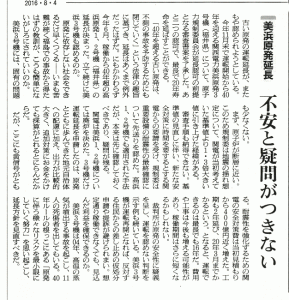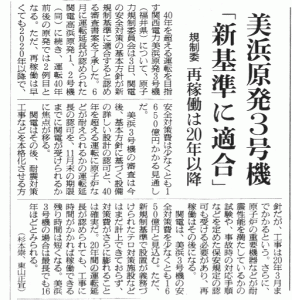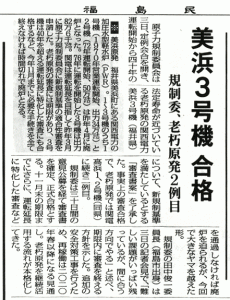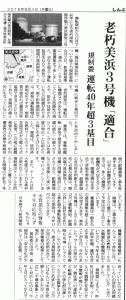Original Japanese written by staffer
The English below written and arranged by Heeday, based on the original Japanese
The English edited by Rev. Dr. Henry French, ELCA
Below: Articles from the August 4th, 2016 editions of the Asahi Shimbun, Fukushima Minpo, and Akahata newspapers
Putting aged reactors to more work
The Kansai Electric Power Company’s Mihama Nuclear Power Plant (NPP) should be into its 40th year of operation this coming December. The NPP is located in Mihama, Fukui Prefecture (some 80km [50 miles] NNE of Kyoto). Japan’s Nuclear Regulation Authority (NRA) has approved the inspection report, one of the requirements to extend the NPP’s operational life. Two more approvals, and the NPP can legally run for up to two more decades.
The relevant nuclear power control laws stand on the principle that “any reactor aged 40 years or more should basically be shut down to prevent any unexpected accident.” Thus, legally speaking, life prolongation of a reactor is an exceptional measure. In spite of the spirit of these laws, in June 2016, the NRA gave the go-ahead to two other aged reactors in Fukui, namely Units 1 and 2 of Takahama, both of which are more than 40 years old. Now, will the Authority give the same go-ahead to Mihama’s Unit 3 as well? Where is the “spirit” of the law?
And its own problems
Besides its age, Mihama’s Unit 3 has other problems as well. First, the reactor is located close to a geological fault. The NRA, therefore, had to raise the level of the reactor’s “maximum seismic intensity” 1.3 times above what Kansai Electric originally proposed. To meet this new and higher seismic standard, the power company asked the NRA for more time to take new safety measures. Thus, the Authority decided to “wait and see” before holding the final inspection of the seismic resistance capabilities of Unit 3’s major facilities. The same “wait and see” attitude took place with Units 1 and 2 of Takahama. In truth, however, seismic resistance inspection should be conducted in the beginning of the whole inspection process.
Furthermore, Kansai Electric decided to abolish Units 1 and 2 of Mihama. Why is it trying to extend the life of Unit 3 alone? One factor is that the economy of the municipality hosting the NPP has been dependent on the power plant. Another factor is that Unit 3 provides greater power output and, therefore, can be still profitable even after all the additional safety measures have been taken. Here, once again, we see the major factors that make Japan hold on to nuclear power—“economic addiction” to NPPs of the municipalities hosting them, and power companies going for money at the cost of safety.
Once a major NPP disaster has hit —-
Turning our eyes to where I am, Fukushima, many are still living with serious difficulties after the Fukushima Daiichi disaster took away their jobs and their hometowns. Once a major NPP accident has contaminated the environment, there is nothing we humans can do to bring it back to normal. This is obvious when you see what is happening here.
True, much decontamination work has been done—removing radioactive soil and cleaning road surface asphalt. After a while, however, the radiation levels of those “decontaminated” places rise again. I live and work in Koriyama, Fukushima, where many kids stroll around today, seemingly care-free. The town might seem to be at perfect peace. Actually, however, there are countless “hot spots” where the radiation levels are dangerously high. Thus, many parents tell their children not to touch the soil or plants. And many kids can stay outdoors for only limited periods of time. Those parents are seriously worried that their children will experience some radiation-related health problems, as well as mistreatment from other people. Worse yet, those parents simply have to keep these worries to themselves. It is not easy here for residents to talk about such worries, since doing so can ruin their relationships. In short, radiation has robbed the residents here of the right to live in freedom and in peace.
The Japanese author’s opinion
5 and 1/2 years ago, most people of this archipelago saw what terrible things radiation can do, and reconsidered what truly matters to them. The NRA, supposedly learning lessons from the Fukushima Daiichi disaster, has set up new nuclear regulations, saying that “there is no end to our efforts for nuclear safety. Always, we have to strive for a higher safety standard.” Now, however, economic greed is corroding such “repentance.”
Dear readers, are you aware of where electric power, something you consume every day, comes from? Today, residents of Japan are capable of choosing who should supply power to our homes. Thus, every one of us is, in one way or another, involved in national energy policies. We need to be wise; we cannot let national energy policies ruin either our beautiful natural environment or our freedom to live in peace. We are the ones to prevent another nuclear disaster.




